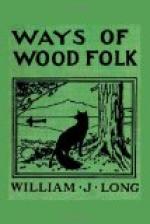The next day, at noon, he was stretched out on the sill, drunk again. For three days he kept up his tippling, coming out when the sun shone warmly, and going straight to the fatal tumbler. On the fourth day he paid the penalty of his intemperance.
The morning was very bright, and the janitor had left the hornet’s window slightly open. At noon he was lying on the window sill, drunk as usual. I was in a hurry to take a train, and neglected to close the window. Late at night, when I came back to my room, he was gone. He was not on the sill, nor on the floor, nor under the window cushions. His nest in the casing, where I had so often watched him asleep, was empty. Taking a candle, I went out to search under the window. There I found him in the snow, his legs curled up close to his body, frozen stiff with the drip of the eaves.
I carried him in and warmed him at the fire, but it was too late. He had been drunk once too often. When I saw that he was dead, I stowed him away in the nest he had been seeking when he fell out into the snow. I tried to read; but the book seemed dull. Every little while I got up to look at him, lying there with his little pointed face, still dead. At last I wrapped him up, and pushed him farther in, out of sight.
All the while the empty tumbler seemed to look at me reproachfully from the window sill.
XIII. SNOWY VISITORS.
[Illustration]
Over my table, as I write, is a big snowy owl whose yellow eyes seem to be always watching me, whatever I do. Perhaps he is still wondering at the curious way in which I shot him.
One stormy afternoon, a few winters ago, I was black-duck shooting at sundown, by a lonely salt creek that doubled across the marshes from Maddaket Harbor. In the shadow of a low ridge I had built my blind among some bushes, near the freshest water. In front of me a solitary decoy was splashing about in joyous freedom after having been confined all day, quacking loudly at the loneliness of the place and at being separated from her mate. Beside me, crouched in the blind, my old dog Don was trying his best to shiver himself warm without disturbing the bushes too much. That would have frightened the incoming ducks, as Don knew very well.
It grew dark and bitterly cold. No birds were flying, and I had stood up a moment to let the blood down into half-frozen toes, when a shadow seemed to pass over my head. The next moment there was a splash, followed by loud quacks of alarm from the decoy. All I could make out, in the obscurity under the ridge, was a flutter of wings that rose heavily from the water, taking my duck with them. Only the anchor string prevented the marauder from getting away with his booty. Not wishing to shoot, for the decoy was a valuable one, I shouted vigorously, and sent out the dog. The decoy dropped with a splash, and in the darkness the thief got away—just vanished, like a shadow, without a sound.




